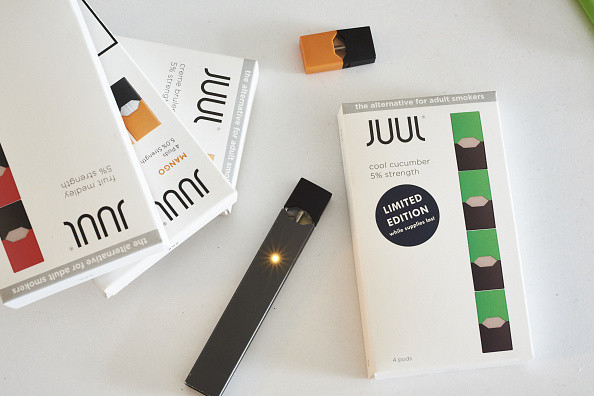
It’s About to Get a Lot Harder to Buy Flavored Juul Pods
November 13, 2018Juul Labs—the massive e-cigarette company that has faced mounting pressure over the number of teens addicted to its products—will at least temporarily stop taking retail orders on its flavored nicotine pods, the New York Times reported Tuesday. The Federal Drug Administration has been cracking down on the company since April, which culminated in an October 2 raid on Juul's offices in San Francisco and the seizure of 50,000 pages of internal documents.
The company, which spun off of the vape company Pax Labs in 2017 and is now reportedly valued at $15 billion, was also given 60 days back in September to prove that it was trying to curb teens' use of its namesake product. That deadline passed over the weekend, and this latest announcement suggests that half-baked plans, such as developing a lower-nicotine formula and attempting to roll out a bizarre, janky curriculum in schools to teach kids about the dangers of e-cigarettes, weren't enough in the end.
Juul's detractors also say that getting rid of flavors like crème brûlée could help stem what has been referred to as a public health epidemic, since many teens don't seem to know those candy-flavored products contain nicotine. Although Juul is going to stop taking orders from stores for nicotine pods in flavors such as mango and cool cucumber, at some unspecified point down the line, the company apparently plans to sell them to stores that invest in age-verification technology. (As the Times noted, that tidbit was relatively hidden in the company's announcement.)
What's more, Juul announced it will be shutting down its Facebook and Instagram feeds—though it could easily be argued that teen influencers have been more effective in marketing vaping to underage kids than more official channels.
Besides the FDA crackdown, Juul has weathered an attorney general's probe and two lawsuits in California. Throughout the scuffles, the company has maintained it's dedicated to helping adults quit combustable cigarettes rather than hooking kids on electronic ones. But as activists have pointed out, those seemingly high-minded goals are fundamentally incompatible with capitalism, as it takes a constantly renewing customer base for any business to stay afloat. Still, like many Silicon Valley start-ups, the company is committed to the line that it's helping the world rather than doing harm.
"We share a common goal with FDA to keep JUUL products out of the hands of youth: We cannot be more emphatic on this point," the company said in an emailed statement. "We don’t want anyone who doesn’t smoke, or already use nicotine, to use JUUL products—especially youth. At the same time, we are committed to improving the lives of the world’s one billion adult smokers, with the ultimate goal of eliminating cigarettes. But we know that to successfully fulfill our mission of helping adult smokers, we must be trusted—and we must earn that trust. That starts with action, not words."
As for the future of the company, Marc Scheineson, partner and leader of Alston & Bird’s Food and Drug Law Practice and former FDA associate commissioner for legislative affairs, says that giving up the flavored pods without a fight was a good financial move. He says that, while he's sure these concessions will damage Juul's bottom line, they're also likely to get the FDA to back off for a bit as opposed to taking more drastic measures.
"If I were a betting man—and it's always hard to bet when it's the FDA—I would bet that this is enough, and you'll see them take credit for these voluntary concessions," he told me.
Sign up for our newsletter to get the best of VICE delivered to your inbox daily.
Follow Allie Conti on Twitter.


